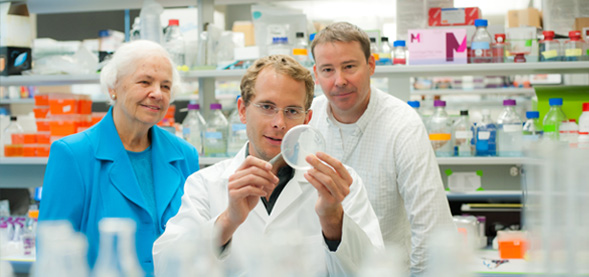 Healthcare is about to undergo a revolution as new technologies to predict, detect, monitor, and treat disease at the molecular level become available. Increasingly inexpensive genomic technologies are now being introduced to identify genetic variants, inform preventative care and guide disease therapy. Emerging proteomic and metabolomic technologies can provide accurate diagnostics to monitor the wellness of organs in the body, to detect disease and to determine efficacious, non-toxic therapy. Developments in the relatively new areas of the epigenome and microbiome will provide additional insight into disease therapy and maintenance of wellness. Implementation of healthcare based on the unique molecular makeup of each individual, commonly termed “personalized medicine”, has been demonstrated to allow effective preventative care, improve the safety (reduce adverse drug reactions), efficiency (only treat patients with medicines that work on them) and effectiveness (more accurate diagnoses, better matching of treatment to disease) of the healthcare system and has potential for reduced per capita costs and a dramatically improved patient and provider healthcare experience.
Healthcare is about to undergo a revolution as new technologies to predict, detect, monitor, and treat disease at the molecular level become available. Increasingly inexpensive genomic technologies are now being introduced to identify genetic variants, inform preventative care and guide disease therapy. Emerging proteomic and metabolomic technologies can provide accurate diagnostics to monitor the wellness of organs in the body, to detect disease and to determine efficacious, non-toxic therapy. Developments in the relatively new areas of the epigenome and microbiome will provide additional insight into disease therapy and maintenance of wellness. Implementation of healthcare based on the unique molecular makeup of each individual, commonly termed “personalized medicine”, has been demonstrated to allow effective preventative care, improve the safety (reduce adverse drug reactions), efficiency (only treat patients with medicines that work on them) and effectiveness (more accurate diagnoses, better matching of treatment to disease) of the healthcare system and has potential for reduced per capita costs and a dramatically improved patient and provider healthcare experience.
Personalized medicine is expected to benefit from integrating genomic information with the regular monitoring of physiological states by multiple high-throughput ‘omic methods. In this plan the LSI proposes to further develop an integrated personalized medicine platform that would develop integrated personal profiles utilizing expertise in genomic, transcriptomic, proteomic (glucomic), metabolomic (lipidomic), microbiomic and epigenomic (collectively referred to as ‘omic) LSI based capabilities. Computational biological analysis of such Big Data sets can reveal various medical risks and uncover extensive, dynamic changes in diverse molecular components and biological pathways across healthy and diseased conditions. In many cases the exact mechanism of disease or a biomarker indicating disease will not be sufficiently understood. The LSI will then extend computational analysis and select likely candidate causal genes for functional studies in a selection of routinely operating and validated model systems including cells, C. elegans, Drosophila, zebrafish, and humanized mice (a.k.a. individual experimental avatars); linking genotype to phenotype. The evolutionary conservation of many human genes has made characterization in model systems a powerful approach for gaining insights into human biology. These insights would then inform the practitioner on the best course of action for therapy.
These extensive personal ‘omics profiles can be applied to healthy individuals and patients in any disease state including rare genetic disorders and cancer. Supported by leading experimental tools to decipher unknown and complex causal factors, LSI in combination with the clinical community, Ministries of Health, Advanced Education and Technology, Innovation and Civilian Services, Health Authorities will the deliver personalized healthcare solutions to the citizens of BC. Certain technologies currently have limited throughput of this analysis, but only through initiating this process and putting it into practice with additional development will generally accessible systems of personalized medicine be realized.




